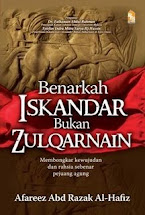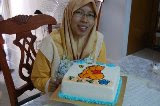Semalam merayau-rayau, membeli-belah di pasar alam maya. Cadangnya nak cari input untuk buletin remaja bulan ini. Terpikir juga untuk ketengahkan ngenai 'techno da'ie' sebagai bicara utama dalam buletin tu. Terjumpa satu artikel yang rasanya ini menarik untuk para remaja dan pelajar ipt kat Perlis ni membacanya.
----------------------------------------------------------------------------------
Using technology to understand Islam
Shaikh Mohd Saifuddeen Shaikh Mohd Salleh
Fellow
Institut Kefahaman Islam Malaysia
15 Februari 2003
IT is not difficult to see why some people do not regard technology as being important to Islam.
Technology" is a word that could not to be found in the Quran nor the prophetic traditions. The word has Greek and Latin origins. "Technology" is derived from the Greek word "tekhnologia" and the Latin word "technolo-gia" which can roughly be translated to "a systematic approach in doing things".
Since the word "technology" is not of Arabic origin, it is of no surprise that it could not be found in either the Quran or Hadith. However, this does not mean that there is no mention of the usage of technology in both these im-portant sources of reference for Muslims.
For anyone who studies the Quran as well as the Hadith, they would easily find many instances where the usage of "technology" is mentioned. Of course, most of these instances are subtle, but if a person were to think deeply, he or she would find the use of technology is implied.
The Quran, for example, mentions various technologies to be found throughout civil-isation such as ship-building, navigation, metallurgy, construction and information and communication technology (ICT).
In Verse 23 of Surah al-Mukminun, for instance, God tells of the story of Prophet Nuh who was instructed to build an ark as a refuge for the believers from the great storm that was approaching. No doubt there is no mention of "technology" from this verse.
Nonetheless, one can deduce from this verse that in order to build an ark that could withstand the terrible thunderstorm and at the same time carry many people and animals without sinking would require the appropriate knowledge in shipbuilding.
This knowledge is "technology". That is why Islam always stresses the importance of gaining and mastering knowledge, and thus, gaining and mastering technology.
This has always been the prerequisite for any civilisation to advance; and the same still rings true. Looking at what is transpiring in today's world, one could see that "he who possesses technology controls the world".
Much has been said about the need for Muslims to master technology, but unfortu-nately little has been done about it. As a result, we see Muslims of today being belittled and left behind in all areas. Muslims must realise that knowledge — and technology — will benefit the Muslim world at large.
All this while, ICT has been used to disparage Islam with negative images such as terrorism, poverty, illiteracy and the likes. Muslims should realise that ICT also provides a level playing field for everyone.
Hence, anyone with knowledge of ICT, including Muslims, could make full use of it. Efforts should be taken to ensure Muslims capitalise on this technology to correct the distorted image of Islam. Muslims could make use of ICT to de-demonise Islam.
Technology could also be used to further enhance the understanding of both Muslims and non-Muslims on Islam. When we say "technology", we are not just limiting ourselves to ICT. This fact should be realised by the preachers of Islam.
There should be a new generation of preachers or daie who could utilise modern tools and technology to disseminate the correct understanding of Islam.
This new breed of daie — the techno-daie if you will — is an important aspect of modern Islam. Without them, it would be difficult to present the true Islam in this post-modern world that we now live in.
The new generation in particular are be-coming more techno-savvy. So what better way to approach the post-modern generation than to apply that which they are most comfortable with? Why not use technology to narrow the gap between the daie and the community? ICT, for instance, could be utilised to the maximum by the techno-daie to disseminate information on Islam. Multimedia, to take an example, could be used to teach young children how to read the Quran correctly. Multimedia is interactive and combines the usage of most senses. This would make learning the Quran more interesting, especially to today's children.
ICT also presents an endless possibility to the techno-daie. Say, for instance, a techno-daie were to deliver a lecture in a mosque. He could make use of web-based presentation tools to make his talk more interesting. The audience would also be able to remember more effectively if multimedia is used.
Also, if classical works of Islam such as the voluminous Imam Syafii's Kitab al-Umm or Ibn Khaldun's Muqaddimah are produced in the form of CD-ROM, this would help the techno-daie carry these references anywhere.
The techno-daie would just need to carry a couple of CD-ROMs as opposed to several volumes of very thick books around. All the techno-daie would need is of course a laptop, which is becoming lighter and much easier to carry as technology progresses.
In Verse 125 of Surah al-Nahl of the Quran, God says to the effect that: "Invite (all) to the way of thy Lord with wisdom and beautiful preaching; and argue with them in ways that are best and most gracious: for thy Lord knoweth best, who have strayed from His path, and who receive guidance".
Using technology for dakwah is in line with using wisdom and beautiful preaching in dakwah as mentioned in the verse. The advancement of technology also demands that the audience be techno-savvy as well.
Tools such as the palmtop and the personal digital assistant (PDA) should be used by audience of a religious lecture to take down notes. Listening alone is not sufficient. Research has shown that to fully understand what is being taught, one must listen and jot down what one hears. This, unfortunately, is rarely done by Muslims when it comes to learning.
Looking back at the history of Islam, we could see that one of the most revered scholars of Islam, Imam Syafii, is someone who never failed to write down what he learnt.
During his early years as a student, he was too poor to purchase proper writing materials. Nevertheless this did not deter him even a little bit. He used his palm and saliva to replace the materials he could not afford to buy.
Imam Syafii may have used his palm to study. In this day and age, we could use palmtops and PDAs.
Maybe in the past, it is cumbersome to carry around books, pens, pencils and erasers especially if one is going to the mosque. However, today with the palmtop and PDA, things are made very much easier for us.
Why not take advantage of this develop-ment in order to better ourselves with the knowledge of Islam? Why should this technology not be used in our quest to truly
understand Islam? Perhaps, aside from the importance of creating a new breed of daie, that is the techno-daie, we must also at the same time focus on creating a new breed of ummah, that is the techno-ummah
Tuesday, March 01, 2005
We Are "Techno Da'ie"
Labels:
info
Subscribe to:
Post Comments (Atom)







No comments:
Post a Comment